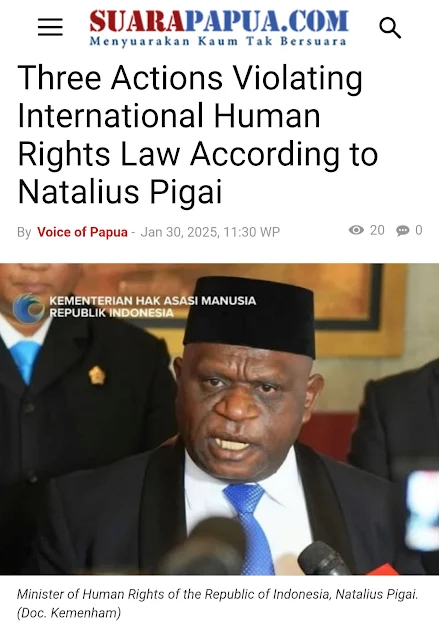Indonesia’s Human Rights Circus: A Bloody Farce in Papua
Indonesia loves to parade its so-called moral superiority, proudly flaunting the existence of a Ministry of Human Rights.
As if simply having one automatically absolves it from the atrocities committed in its own backyard. But this claim, rather than being a badge of honor, is a grotesque joke when set against the ongoing bloodshed and systemic oppression in Papua.
Let’s not mince words: this is not just hypocrisy—it’s state-sponsored mockery!
While Jakarta waves its human rights banner on the international stage, indigenous Papuans are being brutalized, displaced, and silenced. The contrast is staggering: a government that boasts of dignity and justice, while deploying soldiers to burn villages and bury the truth in mass graves. The contradiction isn’t just glaring—it’s nauseating.
And leading this charade? None other than President Prabowo Subianto—a man drenched in allegations of war crimes and human rights abuses from the Soeharto era. This is the man now entrusted with protecting human rights? It would be laughable if it weren’t so tragic. Appointing Prabowo to safeguard justice is like asking a butcher to babysit the sheep.
As if that weren’t absurd enough, Jakarta then installed Natalius Pigai, a Papuan Catholic and longtime human rights advocate, as Minister of Human Rights. On paper, it looks like a progressive move. In reality, it reeks of tokenism. Is Pigai truly a watchdog for justice—or just window dressing for a regime that has done nothing but deny, deflect, and destroy?
Pigai has tried to push back. On January 27, he dared to call out three practices in Papua that amount to violations of international law:
1. Forced Removal from Ancestral Lands: A calculated attempt to sever indigenous Papuans from their identity, their heritage, and their soul. This isn’t just displacement—it’s cultural annihilation.
2. Genocide: Pigai dared to name what many are too afraid to say out loud: that the Indonesian state is engaged in the systematic destruction of a people, their culture, and their very existence.
3. Forcible Expulsion and Population Transfer: Entire communities uprooted through brute force, shoved from their legally inhabited lands without a shred of justification under international law.
These aren’t abstract violations. These are daily realities for Papuans living under occupation. And yet, Pigai’s so-called resistance has yet to break the surface of real change.
His bold tweets make headlines, but his actual power appears to end at the keyboard. His request for the military and police to “review” their use of force? A hollow gesture. A meaningless plea in the face of tanks, bullets, and burning homes. While Papua bleeds, the Human Rights Ministry sends polite emails.
Enough with the Theater—Urgent Action Is Needed!
Pigai’s title comes with a moral burden—and he must carry it with more than rhetoric. The Indonesian government must be forced to confront the reality it created. Tokenism is not justice. Apologies are not reform. And slogans are not solutions.
Only a genuine, unconditional, and inclusive dialogue between Jakarta and the Papuan people can begin to undo the decades of devastation. But that will never happen while the Indonesian state continues to treat Papuan lives as disposable and their voices as threats.
Let's not forget: Papua’s History Is Written in Blood!
The roots of this crisis go back to 1961, when Papua declared independence—only to be crushed by Jakarta’s military hand in the fraudulent “Act of Free Choice” of 1969. Under the shadow of guns, a handpicked few were coerced into surrendering an entire nation’s freedom. That wasn't democracy. It was daylight robbery.
Since then, an estimated 500,000 Papuans have been killed. The forests of Papua echo with the cries of the tortured, the disappeared, and the displaced. Villages razed, women raped, children orphaned—all under the watchful eye of a government that still claims to be civilized.
The Time for Change Is Not Tomorrow—It’s NOW!
The so-called Ministry of Human Rights is a smokescreen—a PR stunt to appease international audiences while blood continues to stain the soil of Papua. Pigai’s appointment was heralded as a sign of progress. It’s proved to be a fig leaf covering a regime that thrives on suppression.
Put plainly, Pigai is a reformer shackled by a system designed to silence reform. He may carry the title of Minister of Human Rights, but the machinery of the Indonesian state — with its entrenched military interests, culture of impunity, and political hypocrisy — leaves little room for genuine change.
His position is paradoxical: expected to advocate for the rights of the oppressed while operating within a government that perpetuates the very oppression he’s supposed to confront. In this context, his efforts, however sincere, risk being swallowed by a bureaucracy that rewards silence and punishes dissent. His words, however brave, cannot fix a system built on brutality.
The Indonesian government must be dragged—by international pressure if necessary—into accountability. And the world must stop pretending that Indonesia is a beacon of democracy while it silences an entire people with impunity.
The Papuan people deserve truth, justice, and freedom. They have suffered long enough under the boot of a nation that calls itself free. Indonesia must stop lying. The world must stop looking away. Papua must be heard—before it's too late.



Komentar
Posting Komentar